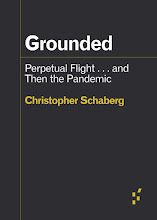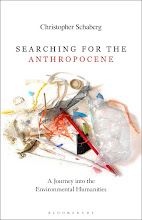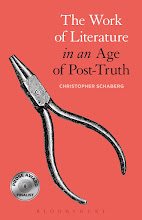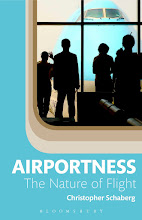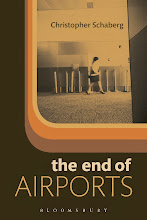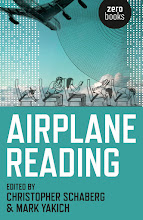How can literature be taught as a collaborative subject? I mean this question in several ways:
1. How can students and instructors collaborate in the literature classroom? (For instance, collaborative in-class writing assignments.)
2. How can students and instructors become self-aware of collaborative learning already happening around the subject literature? (E.g., a chalkboard full of words, diagrams, and sketches contributed by students and instructor alike over the course of a single class.)
3. What literary texts explicitly foreground collaboration—either as writing process, subject of study, or compositional style?
4. How might collaborative essays achieve unique aims around the subject of literature? What new forms of knowledge can come from collaborating around literature?
These are very general questions, prompted in part by my reading of Roland Barthes's "The Death of the Author" and Michel Foucault's "What is an Author?" in a graduate seminar I took at Montana State University taught by Professor Linda Karell on collaboration and authorship. I am now wondering whether it might be effective to dispel myths of the singular Author in an introductory literature course. This Author would be at once the literary genius, the student, and the literature professor. What would a literature class with no Authors look like? Maybe I should experiment on this blog; what would a blog posting without Authorship look like? I am capitalizing the "A" in author to signal the monolithic urge around authorial intention—as if human beings are ever so singularly minded. Wallace Stevens said it interestingly: "I was of three minds, / Like a tree / In which there are three blackbirds."
Saturday, May 31, 2008
Thursday, May 29, 2008
Wikipedia assignment
Final two-part writing assignment for an early-21st-century introductory literature class:
A couple weeks before the end of the term, each student chooses one text that they have read for the class, and posts it as a Wikipedia article. A complete entry would include the name of the author, historical context, a brief summary of the text's content, and a detailed description the text's form. A useful entry would also link internally to other Wikipedia articles, as well as cite external websites that support the claims made in the article.
Then, have students watch and write about how their Wikipedia entry is flagged, edited, shortened, lengthened, or altogether deleted. This assignment would teach students about the challenges of writing about literature in an age of new media, where text is ephemeral yet charged, and citations are at once necessary, all too plentiful, and infinitely digressive.
A couple weeks before the end of the term, each student chooses one text that they have read for the class, and posts it as a Wikipedia article. A complete entry would include the name of the author, historical context, a brief summary of the text's content, and a detailed description the text's form. A useful entry would also link internally to other Wikipedia articles, as well as cite external websites that support the claims made in the article.
Then, have students watch and write about how their Wikipedia entry is flagged, edited, shortened, lengthened, or altogether deleted. This assignment would teach students about the challenges of writing about literature in an age of new media, where text is ephemeral yet charged, and citations are at once necessary, all too plentiful, and infinitely digressive.
Tuesday, May 27, 2008
On aphorisms and arguments
The foundation of many literature courses is the argument. We are supposed to teach students how to construct arguments about texts. In this posting, I argue that aphorisms can leap over while fulfilling the aims of argumentative prose.
How might one compose an aphorism about Flannery O'Connor's story "A Good Man is Hard to Find"? Here is my attempt, including a quotation:
"'We've had an ACCIDENT!' the children screamed in a frenzy of delight." The American road trip reveals a cultural landscape in which revolutions are rendered mundane.
Could such an assignment converge with close reading, analysis, and explication? For Nietzsche, aphorisms were part of a careful system of philosophical rumination. Could meta-literary aphorisms be taught as a replacement for essays? There is certainly a discursive demand for aphorisms, for they must never (re)present the last word, but rather should always remain open to elaboration, description, and conversation. Can aphorisms precede a working knowledge of the structure of argumentative logic? I am not sure, but I am interested in this question.
How might one compose an aphorism about Flannery O'Connor's story "A Good Man is Hard to Find"? Here is my attempt, including a quotation:
"'We've had an ACCIDENT!' the children screamed in a frenzy of delight." The American road trip reveals a cultural landscape in which revolutions are rendered mundane.
Could such an assignment converge with close reading, analysis, and explication? For Nietzsche, aphorisms were part of a careful system of philosophical rumination. Could meta-literary aphorisms be taught as a replacement for essays? There is certainly a discursive demand for aphorisms, for they must never (re)present the last word, but rather should always remain open to elaboration, description, and conversation. Can aphorisms precede a working knowledge of the structure of argumentative logic? I am not sure, but I am interested in this question.
Saturday, May 24, 2008
An Artist Who Likes Theory
Video artist Paul Chan says: "Part of the pleasure of reading Derrida is precisely that I do not have to understand him. Comprehension is not the game. I don't care what he thinks he's saying—I want to read word for word, and pay attention so much that I begin to hallucinate. Which I think is a very reckless way of reading, but for me a productive one."
("Shadow Player: The Provocations of Paul Chan," by Cavlin Tomkins, The New Yorker May 26, 2008, 40-45.)
I think that this is close to my method of teaching literature. I advocate such a "reckless way of reading" in class; I also urge my students to explain their 'hallucinations' precisely and clearly. (Indeed, that's what they are graded on: written clarity.) Yet I wonder: how is this method "productive"? What is produced? Chan calls it "articulate speechlessness." I am not sure where the literature class stands in relation to art and (mystic) philosophy.
("Shadow Player: The Provocations of Paul Chan," by Cavlin Tomkins, The New Yorker May 26, 2008, 40-45.)
I think that this is close to my method of teaching literature. I advocate such a "reckless way of reading" in class; I also urge my students to explain their 'hallucinations' precisely and clearly. (Indeed, that's what they are graded on: written clarity.) Yet I wonder: how is this method "productive"? What is produced? Chan calls it "articulate speechlessness." I am not sure where the literature class stands in relation to art and (mystic) philosophy.
Friday, May 23, 2008
Moving Rocks

Lay down these words
Before your mind like rocks.
—Gary Snyder, "Riprap"
These lines are from a classic Gary Snyder poem that I thought of as I was making a rock pathway today outside the cottage I rent in Davis. Some of Snyder's more recent works are really effective for teaching basic poetics in introductory literature classes. For example, "Day's Driving Done" (from his 2004 collection Danger on Peaks) is a simple ten-line poem about floating in a motel pool at the end of a long day of driving, and listening to the highway sounds. Many college students can relate to the content (if they can't relate immediately, at UC Davis you can always walk out of the classroom building and hear the white noise of Highway 80). The form of the poem plays with space and acoustics in very teachable ways. Sonic tricks such as alliteration, consonance, onomatopoeia, assonance, and internal rhymes are just a few of the devices used in this poem. Line breaks and irregular internal line spacing call attention to specific sounds and silences. I have spent easily over an hour on this one poem in a single class, and the students seem to genuinely enjoy it--and learn from it. Teaching this poem is a good way to practice slow reading.
Thursday, May 22, 2008
"I have nothing to say about this world."
The latest story by Yiyun Li, published in The New Yorker a few weeks ago, introduces literature in a timely manner. Fashion magazines, philosophy, online chatting, and painting are all drawn into an interpenetrating skein of media, yet all under the methodical structure of straightforward narrative. It would be interesting to teach this story by way of the various media forms that orbit around -- and at times intersect -- the interior world of the main character, Teacher Fei. One can imagine an assignment that might ask students to consider how this 'story' manages different forms of media. In the story, which media forms does narrative defer to? What media forms strive to mimic or tap into narrative? How does narrative allow for medial blindspots? Such questions might nudge students toward thinking about literature in the context of new media.
Wednesday, May 21, 2008
on the possibility of literature blogs
In a discussion on teaching "Introduction to Literature" courses at UC Davis, two colleagues and I speculated about the possibility of using blogs for the entire writing content of the course. Could this be done? Here is how it might look: Each student must create a blog, and the first posting (or 'writing assignment') would be to reflect on the choices one makes when setting up a blog. How does literature warrant certain aesthetics? (This could be discussed in relation to the form of literature anthologies, with all their humanistic overtures and inter-textual over-determinations.) From this point on, students would be required to compose a blog posting each day in response to the texts read for class. Assignments might include: responding to a classmate's blog posting; an entry that only cites other online literature essays (for example, a thesis hunt); a revision of another student's posting; a posting that uses literary terms to describe or comment on a movie; a meta-critique of the process of blogging on literature. This would be a fresh approach to the work of teaching literature in the age of digital reproduction.
Subscribe to:
Posts (Atom)





